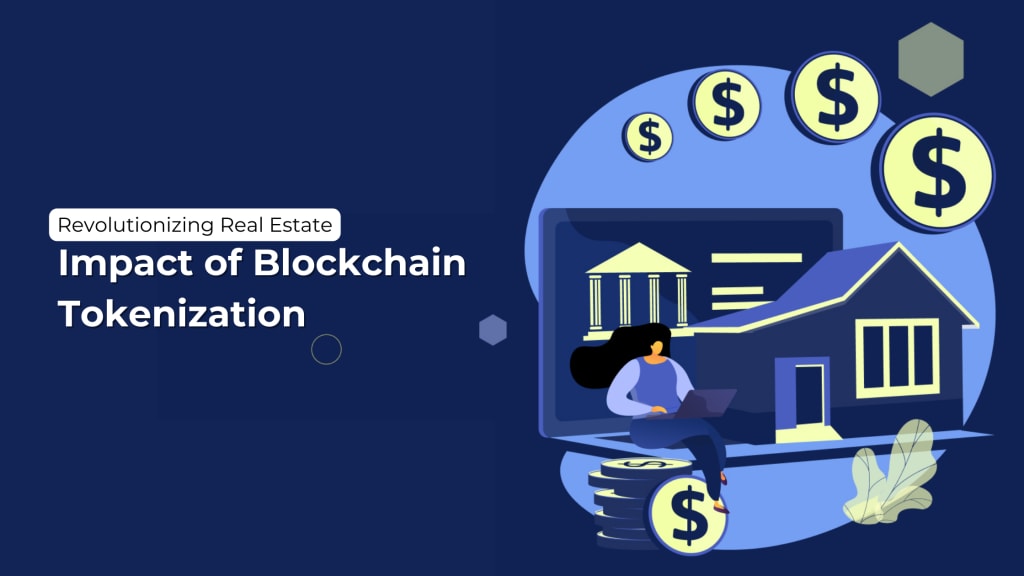Revolutionizing Real Estate: The Impact of Blockchain Tokenization
Real Estate Tokenization

The real estate industry has undergone a radical transformation as a result of the use of blockchain technology. It encourages ownership of digital real estate, makes the area accessible to people who were previously shut out owing to financial constraints, and covers problems like a lack of transparency and trust.
Real estate has always been a fairly illiquid asset, requiring significant capital commitments and lengthy transaction processes. However, tokenization changes this situation. Additionally, the underlying blockchain technology brings unprecedented transparency. That is, buyers can now execute transactions immutably using tokenized real estate.
This essay debunks the myths surrounding real estate tokenization and provides information on its existence, how real estate tokens work in practice, what tokenized ownership means, and how much real estate has been tokenized. First, let's talk about how fractionalization and the tokenization that follows are changing real estate.
What is the tokenization of real estate?
Tokenization of real estate refers to the process of dividing an asset into digital tokens that represent the underlying property and all of its rights and obligations. Smart contracts are used to define contract details. If predefined contract conditions are met, the algorithm encoded in the digital contract will activate the events specified in the code.
For example, smart contracts can execute transfers in the land registry without any human role. It verifies the operation and automatically generates another block, adding it to the blockchain.
For fractionalization of NFTs, use ERC-721 tokens. ERC-721 represents a set of standards on the Ethereum (ETH) blockchain and is associated with smart contracts that track transactions within which these tokens play a role. The ERC-721 standard is designed to enhance transaction traceability and security.
How does real estate tokenization work?
Real estate tokenization works similarly to the crowdfunding process, where assets are divided into small parts with the help of smart contracts, which are automated pieces of code that reside on the blockchain. Anyone who buys or owns a token owns a piece of real estate. They are entitled to the underlying assets and related profits and losses.
To understand it better, let's assume someone owns a property worth $100,000 and they need some quick cash. But the investors approaching them did not have the required amount, and the owners were unwilling to part with their properties for a cheaper amount.
This is where tokenization comes in handy. Their assets will be decentralized, with each unit representing $1,000 of digital tokens. This way, the assets can be easily invested over some time. This is done via a decentralized network and therefore is completely transparent.
What is tokenized real estate?
A Beginner’s Guide to Digital Real Estate Ownership
Whether commercial, residential, or apartment, real estate can be tokenized. Expensive commercial properties such as malls and malls can be cut into pieces to make the investment affordable. Tokenization of apartments in multi-story residential skyscrapers can expedite sales and purchases. Through tokenization, people can raise money for projects while selling their trophy assets.
Trophy properties are unusually scarce properties that are in high demand from investors. Iconic buildings with substantial real estate bases fall into the trophy asset class. It doesn't have to be a building. It could even be a vineyard that produces high-quality grapes for the production of wine, or a riverbank that holds gems. Tokenization can therefore go from digital shares to part of a contract, equity in a legal entity, or ownership of collateralized debt.
Multiple Benefits of Real Estate Tokenization :
Tokenization can greatly benefit the real estate industry and bring about some amazing changes. Let's take a look at them:
Transactions are more transparent and efficient
Due to the decentralized structure of blockchain, transactions are immutable and transparent, making it ideal for real estate with a range of stakeholders and complex procedures. Automated smart contracts remove any human role from the transaction, thereby eliminating any unfair transactions.
In a blockchain-based system, there is no paperwork or waiting time to complete a transaction. This results in swift action and quick transactions. Unlike traditional banking systems, when blockchain is used for real estate, there are no specific office hours for transactions. Instead, the system works transparently around the clock.
Better liquidity
Under the traditional system, selling a property was always painful. Before the advent of digital real estate ownership, liquidity issues plagued real estate and caused investors heartburn. Due to the lack of liquidity, many investors are simply not prepared to get involved in real estate matters.
In order to increase the value of any asset, its lack of liquidity must be overcome, and tokenization provides the solution. When a real estate piece is divided during the tokenization process, its liquidity increases. Owners of tokenized works can quickly sell their tokens, rather than selling the entire property at once, resulting in a rapid change of ownership.
Opportunities for small investors
Real estate is often considered an investment option for the elite. However, tokenization also makes investing in real estate feasible for small-scale investors. The high prices of real estate assets often deter investors from participating if their pockets are not deep.
The tokenization of real estate assets, however, has altered the landscape and opened up real estate to retail and small-scale investors. Large assets are divided into smaller parts through tokenization, making them more inexpensive and available to interested parties.
Free-moving marketplace
Centralized financial systems tend to be prejudiced and excessively regulated, which hinders the free movement of capital. Tokenization based on blockchain presents an impartial, decentralized finance system to the real estate sector.
A little control lies with each stakeholder, who makes collective decisions. Removing unreasonable barriers leads to a streamlined market that provides equal opportunities for growth to all stakeholders.
Reduce counterparty risk
Long transaction chains are difficult to trace. This is a challenge in the era of pre-tokenized real estate, where third parties involved make things murky and far from transparent. Smart contracts are an integral part of blockchain-based transactions and make things better from a regulatory perspective.
Minimal human interaction keeps transaction chains short and eliminates risks associated with weak links. Therefore, the risk of counterparty involvement is significantly reduced, if not completely eliminated.
Limitations of Real Estate Tokenized Assets :
Like any upcoming technology, real estate tokenized assets come with their own set of issues. Let's look at some limitations:
Smart Contract Security Vulnerabilities
Blockchain networks are quite secure. But when it comes to smart contracts, there are loopholes that need to be plugged. Hackers have been trying to sneak into the code of smart contracts and steal funds. Unless smart contracts are carefully audited, the funds involved are not safe. A hack or glitch in the system could deprive real estate investors of their assets. Worse yet, once these assets are lost, they are impossible to recover.
Complex licensing requirements
Real estate tokenization necessitates a permissioned platform that allows for the regulation of STO (Security Token Offerings) management and operation. Getting a license is a complicated process. To succeed, you must go through several phases of trial and error and repeated testing before you ever reach the licensing step.
regulatory issues
Most people working in regulatory agencies and real estate employees are unaware of how blockchain technology works and helps eliminate problems faced by the industry. This lack of knowledge leads to a poor regulatory environment that creates obstacles for all stakeholders. Regulatory uncertainty has eroded investor trust, leading to sluggish growth.
tax complexity
Cryptocurrency tax regulations are not defined in most tax systems, which creates problems for stakeholders. Although the advantages of tokenization are recognized globally, there is not a sound tax system. The lack of a unified tax system creates doubt in the mind of everyone involved.
The future of digital real estate :
Real estate has always been a hot deal, although it wasn't as readily available as it is now. The tokenization of real estate assets also makes it accessible to small-scale investors. People who were once frustrated by expensive real estate can now invest thanks to affordable prices, post-monetization.
As regulatory barriers get better over time and cryptocurrencies become part of the mainstream, you can expect the pace of tokenization to accelerate. Commercial and residential real estate tokenization may have different legal requirements and diverse applications of the underlying technology. Life could get easier for stakeholders on all fronts.
About the Creator
BlockchainX
BlockchainX is a leading Blockchain development company rendering services across all streams. From NFT market to metaverse development, we help you simplify your tasks and identify better solutions for business in web3.






Comments
There are no comments for this story
Be the first to respond and start the conversation.